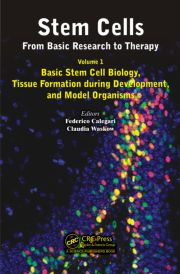Summary
The first volume of Stem Cells deals with the fundamental principles that govern embryonic and somatic stem cell
biology. Historically, the identification and characterization of such pathways and general rules of stemness occurred
during embryonic development and Volume I reflects this with topics spanning cell cycle regulation, epigenetics, and
asymmetric cell division in a number of organ systems from planarian to human. Three specific sections discuss i) Basic
Stem Cell Biology, ii) Tissue Formation During Development, and iii) Model Organisms with particular emphasis on those
more relevant for biomedical research and, thus, leading to the topics addressed in Volume II.
Table of Contents
Basic Stem Cell Biology. Cell Cycle Regulation of Pluripotent Stem Cells. Asymmetric Cell Divisions and Nuclear
Migration of Neural Progenitors: Two Mechanisms that Influence Neurogenesis. Epigenetic Regulation of Adult Stem Cells.
Hematopoietic Stem Cell Aging and Oxidative Stress. Bioelectric Controls of Stem Cell Function. Tissue Formation During
Development. Development From the Fertilized Egg to the Three Layers and its Relevance to Signaling and Lineage
Commitment of Ebryonic Stem Cells. Hematopoiesis During Embryonic Development. Neural Progenitors and Evolution of
Mammalian Neocortex. Dynamic Gene Networks in Neural Stem Cell Regulation. Stem Cells in the Development, Regeneration
and Repair of the Retina. Progenitor Cells in Embryonic and Adult Lungs. Cells During Tooth Development. Liver and
Pancreas: Mechanisms of Development. Model Organisms. Developmental Regulation and de novo Formation of Stem Cells in
Plants. Planarian Totipotent Stem Cells. Zebrafish in Stem Cell Research. Deer Antler Stem Cells ?New Aspects and
Findings. Genetic Manipulation of Pluripotent Stem Cells.


